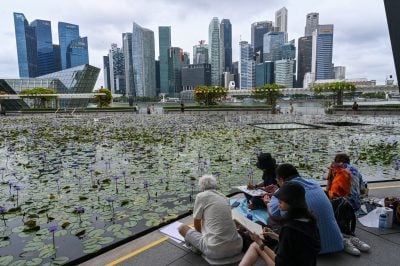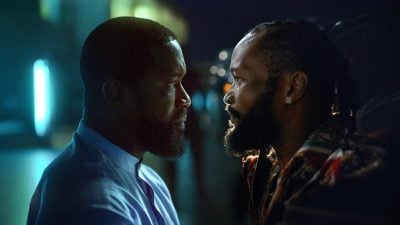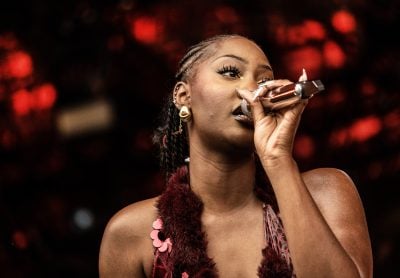Just over 20 years ago Chimamanda Ngozi Adichie’s debut novel Purple Hibiscus first bounded onto the global literary stage, garnering critical acclaim including shortlistings for the Orange Prize for Fiction and the Commonwealth Writers’ Prize for Best First Book.
It marked a significant turning point in the representation of African voices in literature. The novel, which tells the story of a Nigerian girl navigating familial tensions and society’s expectations, was praised for its compelling narrative and exploration of complex themes. Adichie’s best-selling later novels, including Half of a Yellow Sun (2006) and Americanah (2013) also went on to win multiple accolades.
Her masterful storytelling captivated readers around the world and flung open the door for subsequent African authors to share their stories with international audiences.
The legacy of Adichie (pictured above receiving the W.E.B Du Bois Medal, Harvard University’s highest honour in the field of African and African American studies) can be seen in the growing success of novels written by African-origin authors, both born on the continent, and from the diaspora, on the global publishing scene.
Nigerian-British novelist Oyinkan Braithwaite’s 2018 novel My Sister, the Serial Killer enjoyed global success, winning multiple awards including the 2019 Anthony Award for Best First Novel, and was longlisted for the Booker Prize, as Purple Hibiscus had been. In 2021 Zanzibar-born writer Abdulrazak Gurnah won that year’s Nobel Prize in Literature for what the academy called his “uncompromising and compassionate penetration of the effects of colonialism and the fate of the refugee in the gulf between cultures and continents.” Only weeks later, South African author Damon Galgut won the prestigious Booker Prize for his novel The Promise (2021).
Growing acclaim
Accolades enjoyed by talented African authors are continuing to mount. Only four months into 2024, the novels of Nigerian author Ayobami Adebayo and British-Ghanaian writer Caleb Azumah Nelson, A Spell of Good Things and Small Worlds respectively, have been shortlisted for this year’s prestigious Dylan Thomas Prize, which celebrates young writers and brings international prestige as well as a prize of £30,000 ($37,800)
Zimbabwean author Farai Mudzingwa’s debut novel Avenues by Train is a coming-of-age story set in modern-day Zimbabwe that tells the story of the protagonist’s life after witnessing the death of his friend as a young boy. It has been shortlisted for the 2024 Republic of Consciousness Prize, which supports publishers with their ongoing commitment to work of high literary merit. Avenues by Train was described by the judges as “an assured debut” which “addresses the objective truth of these lives but also deftly conveys the character’s subjective understanding of the forces that influence their fate”.
Bibi Bakare-Yusuf is the co-founder and publishing director of Cassava Republic Press, a Nigerian company that published Avenues by Train as well as works by other award-winning authors including Teju Cole and Chigozie Obioma. Bibi founded Cassava Republic Press in 2006, three years after the commercial and global renown enjoyed by Purple Hibiscus. Buoyed by her experiences at the University of Nigeria, Bibi explains in an interview with Semafor Africa that she “was struck by the limited selection of books available and the lack of diversity among authors on the shelves of homes and libraries I visited. Many of the books were business and religious titles, and commercial fiction by Western authors like Dan Brown and Stephen King.”
Determined to change the industry, Bibi set out to create a publishing company that would serve as a platform for African authors to tell their own stories, and Cassava Republic Press is going from strength to strength. Its novels are now enjoying international fame and recognition, particularly in the UK and US.
“Readers are interested in authentic novels about real-life experiences, which is what our publications provide,” she says.
It is perhaps no surprise that the popularity of African novels among a global readership has grown in tandem with the rise of the internet in the 2000s and 2010s. In particular, the rise of social media and online platforms has played a crucial role in amplifying the voices of African authors and connecting them with readers worldwide.
Ayobami Adebayo was catapulted to fame with the publication of her debut novel Stay With Me in 2017. It became a viral sensation among TikTok’s literature-loving community, dubbed BookTok. Videos of readers from around the world discussing and recommending Adebayo’s work have been shared and liked millions of times. Authors including Adichie, Ngũgĩ wa Thiong’o and Teju Cole have gained thousands of new readers through immersive presences on social media platforms including YouTube, Instagram and TikTok, where they regularly engage with readers, share insights into their novels and participate in global literary conversations.
Pushback against colonial literature
In contrast to earlier Western novels written about the continent, including Joseph Conrad’s 1899 novella Heart of Darkness and the “exotic” novels of H. Rider Haggard, African novels throughout the late twentieth and into the 21st centuries marked the beginning of African authors reclaiming the narratives of African literature from the West’s cultural monopoly. The process included the publication of works such as Chinua Achebe’s Things Fall Apart (1958) and Ben Okri’s The Famished Road (1991).
Speaking to The Republic, Farai Mudzingwa explained that Avenues by Train was inspired by his desire to rewrite colonial texts, stating that “Ancestral spirituality, creative expression [and] social practices were sidelined and at times outlawed by the colonisers. I wanted to explore how cultures with disrupted spirituality and culture reconcile with modernity.”
Taiye Selasi, author of Ghana Must Go (2013) believes, however, that the popularity of authors from the African continent has not yet reached the heights that they truly deserve, compared to the success and fame of Western authors. Speaking to the Guardian, Selas argues that “the popularity of around 50 authors on a continent with well over one billion people represents a trickle of success more than a wave.”
She laments the fact that due to lack of education, financial security, and opportunities, many great African writers will never be discovered. The successes enjoyed by authors from the continent are still few and far between, even though the global literature canon would be a very different place without novels such as The Famished Road and Purple Hibiscus.
In an age powered by the internet, social media provides African authors with a platform like none before – to connect with readers, share their stories and voices, and shout about their successes, as well as showcasing the immense and ever-growing global appeal of African fiction. This will continue to inspire the next generation of African writers to firmly stake the continent’s place as a force in the literary world.
Want to continue reading? Subscribe today.
You've read all your free articles for this month! Subscribe now to enjoy full access to our content.
Digital Monthly
£8.00 / month
Receive full unlimited access to our articles, opinions, podcasts and more.
Digital Yearly
£70.00 / year
Our best value offer - save £26 and gain access to all of our digital content for an entire year!

 Sign in with Google
Sign in with Google 



